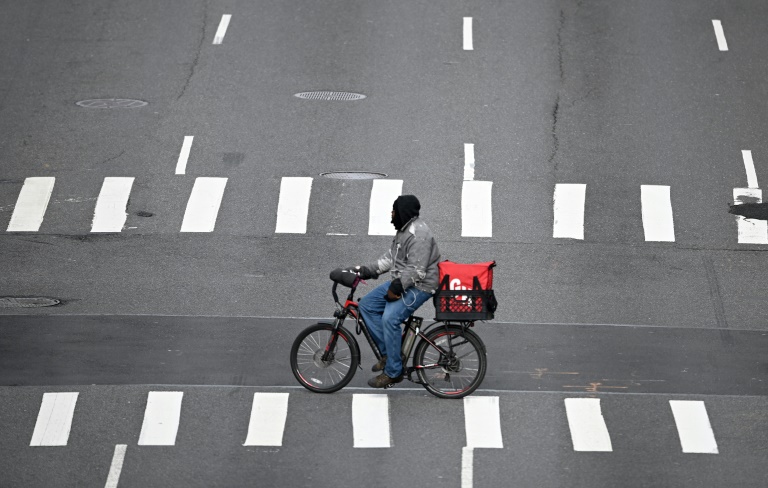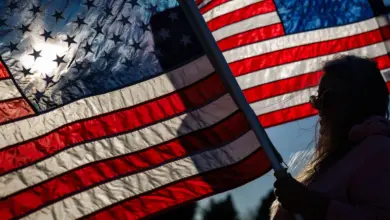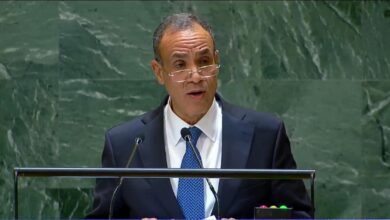
With New York restaurants closed because of the coronavirus pandemic, residents unused to eating at home are increasingly relying on the city’s army of bicycle delivery people for their dinner.
The 40,000 workers, almost always immigrants without health insurance or legal papers, are playing a critical role since all eateries and bars were ordered shut on Monday until April 1.
The riders, who zip around the Big Apple on pedal and electric bikes with parcels of takeout hanging from handlebars, fear contagion but say they have no choice but to continue working.
“While others are at home, we face the risk of getting COVID-19. This truly worries me,” Alberto Gonzalez, who has no health care coverage, told AFP.
“I have a wife and four children at home, they are all taking steps to stay inside, but what good is it if I put them at risk for being on the streets?”
The closures allow New Yorkers to order a delivery or pick-up a takeout, just not sit in restaurants, providing some consolation to the millions stuck at home.
Gonzalez, who lives in Brooklyn and also works with the pro-immigrant organization Make The Road New York, says the riders “need more protection.”
“It is not clear who has priority for the tests, and whether those without insurance or legal status will have to pay for the tests and treatment,” he said.
The drivers are trying to eliminate as much as risk as possible so they don’t catch the virus which has killed more than 7,000 people worldwide and brought cities grinding to a halt.
Many wear gloves and masks and regularly apply disinfectant gel while some have even taken to wrapping plastic bags around the handlebars of their bikes.
“Every time I deliver food I put sanitizer on my hands and change my gloves,” Mexican delivery driver Luis Ventura told AFP as he got off his electric bike in the central Manhattan.
The 30-year-old lost his job as a chef at a Greek restaurant a few days ago due to plummeting business sparked by the fast-spreading outbreak.
Some restaurants are closing and letting staff go after a collapse in orders have left them struggling to pay rent and wages.
Ventura continues to work for food delivery company Postmates, where he makes $9 an hour, less than New York’s $15 minimum wage.
“Honestly this month the money will not reach me,” he lamented.
Abdoulayle Diallo, from Guinea in West Africa, says he takes extra care when touching doorknobs and elevator buttons in customers’ buildings.
“You don’t know who could be sick,” said the 19-year-old, who has worked for delivery company Seamless for two years.
“I am going to continue working because I have no choice. If I sit at home I don’t get paid at all,” he added.
The delivery men are part of America’s gig economy: they receive no benefits and only get paid for the work they do.
Some New Yorkers on social media have called on residents to increase tips for delivery people out of solidarity.
But about a dozen dealers interviewed by AFP said they hadn’t seen an uptick in citizens’ generosity.
“The job is down too much, 70 percent,” said 60-year-old Mexican Martin Balderas, a delivery man for Manhattan fried chicken restaurant Atomic Wings.
“I pray to God to avoid contagion, but we are all at risk,” said Balderas, who earns $8 a hour and has no health insurance.
Balderas, who supports his wife in New York, and sends money to children and grandchildren in Mexico, says he also cannot afford to self-isolate.
“The family has to eat, and the rent is not forgiving here,” he said.
New York Mayor Bill de Blasio offered interest-free loans of up to $75,000 for businesses with fewer than 100 employees that prove they have lost at least 25 percent of their income.
But it cannot save many restaurants burdened with sky-high rents.
For Ousmane Savadogo, a 33-year-old delivery man from the Ivory Coast, it all depends on how long the crisis goes on for.
“If this lasts two weeks, that’s fine. But if it lasts longer, things get complicated!” he told AFP.
Image: AFP / Johannes EISELE A food delivery man crosses 1st Avenue in Manhattan on March 17, 2020 in New York City




